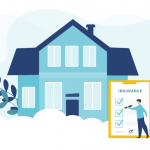Why Your Online Business STILL Needs General Liability Insurance
August 10, 2022

Starting a small business is one of the biggest risks you’ll ever take. And whether it’s a full-blown home-based business, part-time consulting, or some subcontracting gigs on the side, you’ll want to make sure that your efforts are well-protected in case of an accident or emergency.
That’s where Commercial General Liability (CGL) Insurance comes in. CGL Insurance protects your business from third-party claims of bodily injury—like the dreaded slip-and-fall—property damage, and reputational harm caused by your professional activities or employee operations. Most businesses buy it to cover injuries or accidents in-store, in-office, or even on the sidewalk outside.

Depending on your size or industry, it might seem like an unnecessary, added cost, especially if you don’t have a commercial space that’s open to the public or run a traditional brick-and-mortar, construction, or trades business. But there are countless situations where having a solid CGL Insurance policy will come in handy—even if your business is fully virtual. Don’t believe us? Here’s three.
1. Your clients visit you at home.
If you’re self-employed or you work as an independent contractor, then you probably have a home office or a home-based business. But if clients, vendors, employees, or any other visitors visit you at home for any reason, even if it’s just for a few minutes, you could be liable for bodily injury.
Even if someone is responsible for their own injury, they could sue you as long as it happened on your property. Say your walkway wasn’t slippery, wet, or obstructed by any kind of physical hazard. If a visitor still managed to trip while they were picking up some files or delivering a package, you could face legal action.
Unfortunately, many business owners assume that working from home rules out the need for a CGL Insurance since they already have a homeowner’s policy. But your Home Insurance is designed to protect your property, your contents, and your personal liability—not your commercial activities.
Your Professional Liability Insurance won’t kick in either; that’s intended for any errors, omissions, or mistakes you make in the course of business operations, not accidents or injuries. Without proper coverage in place, even a minor accident on your property could cost you big time.
RELATED: 8 Frequently Asked Questions About Home-Based Businesses
2. You visit clients.
Depending on your line of work, you may have to visit your client’s workspace, office, or home, or conduct business somewhere else offsite, like a coffee shop or a park. If your client got hurt, you’d still be responsible for their legal and medical costs. Why? Location doesn’t matter when it comes to injury; as long as your business is involved, you can be sued for any third-party injuries, whether or not they occur on your property.
And it’s not just injury—you could also be held liable for any damage caused by you or your employees to a third-party’s property or possessions. For example, you could accidentally spill coffee on a client’s laptop or knock over an expensive vase at their home. This is an even bigger risk if you employ staff or students; having more workers means there’s more room for error.
CGL Insurance can help you; it’ll cover any injuries or property damage sustained by a third-party anywhere you, your employees, services, or affiliated personnel conduct business, including public spaces and your client’s worksites.
RELATED: All About Commercial General Liability Insurance: What is it, What’s Covered, and What’s Not?
3. You advertise or create marketing materials.
Even if you don’t physically interact with clients—even if you only provide virtual services—you’re still at risk of personal or advertising injury if you have a website, an app, or social media, or if you distribute print material. Depending on your content, you could be accused of writing or implying something negative about a third-party, using a photo that disregards copyright laws, or copying another practice’s advertising ideas.
Say your business produces a blog or a flyer comparing one of your products to a competitor’s. Although there’s no overt physical harm or damage, your competitor could still claim defamation and sue you for libel.
Luckily, CGL Insurance covers a lot more than slip-and-falls and property damage. A standard policy will protect your business from any kind of third-party liability—including defamation, false advertising, violations of privacy, copyright infringement, and other allegations of reputational harm.
RELATED: Risky Business: How Can You Protect Your Home-Based Business?
Your business is much more than your job or career—it’s your passion, your livelihood. You’ve worked hard to build it and you want to see it succeed.
But the truth is: accidents happen. If you’re offering advice, selling products, or providing a service, there’s always a third-party involved, whether that’s a client, vendor, supplier, or a delivery person. And even if the risk of a claim is low, a minor lawsuit could still put your financial health and your reputation into question.
With a comprehensive Commercial General Liability Insurance policy, you can protect your business from further hardship when disaster strikes. To find the right coverage for your business, connect with PROLINK. As a licensed broker with over 40 years of experience, we can help you identify your risks and determine what’s best for your needs, your operations, and your budget.
To learn more, connect with PROLINK today!
PROLINK’s blog posts are general in nature. They do not take into account your personal objectives or financial situation and are not a substitute for professional advice. The specific terms of your policy will always apply. We bear no responsibility for the accuracy, legality, or timeliness of any external content.




